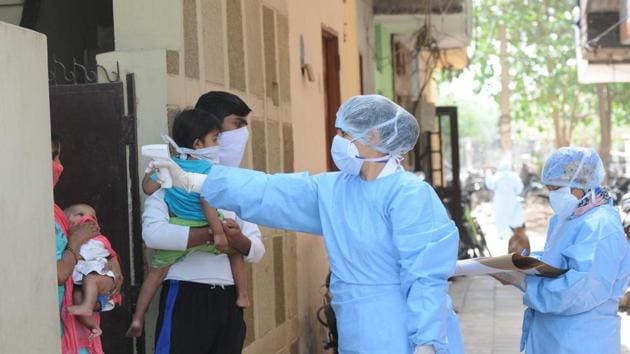Delhi limits access to Covid-19 testing
The new guidelines make the testing criteria in Delhi tighter than those issued by the Indian Council of Medical Research on May 18.
The Delhi government on Tuesday released a document underlining its new testing strategy which, counter-intuitively restricts the access to the tests further even as the number of cases in the state continue to grow.

The new guidelines make the testing criteria in Delhi tighter than those issued by the Indian Council of Medical Research on May 18.
The change means that direct contacts of infected people that are asymptomatic will be tested only if they have co-morbidities or are senior-citizens between Day 5 and Day 10 of coming in contact with a confirmed Covid-19 case. The co-morbidities listed in the order are diabetes, hypertension, and cancer. A senior citizen is one over the age of 60 years.
Coronavirus outbreak: Full coverage
“What this means is only those asymptomatic people who have co-morbid conditions will now be tested. The earlier category allowed for the testing of family members living in the same house or doctors and health care workers exposed to a Covid-19 patient even if they were asymptomatic. Most of the cases – around 70% -- were picked up in family members tested. Now, the government is allowing the testing of only those who have symptoms,” said an official at one of the government-Covid-19 testing laboratories in the city, on condition of anonymity.
Another doctor from a government laboratory confirmed that this would exclude all asymptomatic contacts who do not have any co-morbid conditions.
All cities in Maharashtra, the state most severely affected by Covid-19, for instance follow ICMR guidelines for tests.
The change will only make it more difficult for asymptomatic people that have been exposed to infected people to be tested. Delhi ended Wednesday with 23,645 cases of which 9,542 have recovered and 606 have died. It added 1,513 new cases on Wednesday.
A government spokesperson maintains that they are strictly following all guidelines issued by ICMR.
“We have eased testing guidelines over a period of time to ensure no one who needs testing is left out. However, states always have the flexibility to tweak rules based on their local requirement as long as they adhere to the core of the advisory, and there’s no drastic shift from the guiding policy,” says an ICMR official, who didn’t wish to be identified.
A doctor from one of the private testing facilities also echoed the concern. “Now that there is community spread, the government should be testing more people, not less. Instead, the government has made Covid-19 testing more restrictive. This is also completely in contravention of what the experts from the national medical research body ICMR say,” said the doctor, on condition of anonymity.
To be sure, Delhi conducts the most tests in the country --- 11,285 per million of population based on data till Tuesday night; the national average is 3,078. While the aim of the new guideline is to dissuade frivolous testing at a time when testing capacity is still limited, experts said it is flawed because it leaves out direct asymptomatic contacts of infected people if they do not have co-morbidities or are not old.
“If we test more, we will be able to detect more positive cases and try and contain the disease. But, considering the resource constraints we have been prioritising the testing of people with co-morbidities. So, if a laboratory has a particular capacity, we collect as many samples of the people from high risk groups such as those with diabetes, hypertension, heart or kidney disease or the old instead of the entire family,” said a district official who asked not to be named.
The current testing protocol of the Delhi government allows testing of those with influenza like symptoms – fever, cough, and respiratory infection – who have travelled internationally in the last 14-days or have come in contact with a confirmed case, or are health care or frontline workers. It also allows the testing of those with symptoms living in hotspots or containment zones or those who have been hospitalised.
The testing strategy also includes those who develop Severe Acute Respiratory Illness – defined as someone with fever, cough, and respiratory tract infection in need of hospitalisation.
The only asymptomatic people who can be tested are direct contacts of the infected that have co-morbidities.
In an interview with HT, director of All India Institute of Medical Sciences (AIIMS ) Dr Randeep Guleria had said that the testing threshold had to be lowered so that if there is even a small suspicion a person should be able to get a test.
The order clarifies that no emergency procedure should be delayed for lack of a Covid-19 test. “However, samples can be sent for testing if indicated as above (1-8) simultaneously,” the order read.
Stay updated with all top Cities including, Bengaluru, Delhi, Mumbai and more across India. Stay informed on the latest happenings in World News along with Delhi Election 2025 and Delhi Election Result 2025 Live, New Delhi Election Result Live, Kalkaji Election Result Live at Hindustan Times.
Stay updated with all top Cities including, Bengaluru, Delhi, Mumbai and more across India. Stay informed on the latest happenings in World News along with Delhi Election 2025 and Delhi Election Result 2025 Live, New Delhi Election Result Live, Kalkaji Election Result Live at Hindustan Times.






